- Home
- Arthur Conan Doyle
Round the Fire Stories Page 7
Round the Fire Stories Read online
Page 7
THE BLACK DOCTOR
Bishop’s Crossing is a small village lying ten miles in a south-westerlydirection from Liverpool. Here in the early seventies there settled adoctor named Aloysius Lana. Nothing was known locally either of hisantecedents or of the reasons which had prompted him to come to thisLancashire hamlet. Two facts only were certain about him: the one thathe had gained his medical qualification with some distinction atGlasgow; the other that he came undoubtedly of a tropical race, and wasso dark that he might almost have had a strain of the Indian in hiscomposition. His predominant features were, however, European, and hepossessed a stately courtesy and carriage which suggested a Spanishextraction. A swarthy skin, raven-black hair, and dark, sparkling eyesunder a pair of heavily-tufted brows made a strange contrast to theflaxen or chestnut rustics of England, and the new-comer was soon knownas “The Black Doctor of Bishop’s Crossing.” At first it was a term ofridicule and reproach; as the years went on it became a title of honourwhich was familiar to the whole country-side, and extended far beyondthe narrow confines of the village.
For the new-comer proved himself to be a capable surgeon and anaccomplished physician. The practice of that district had been in thehands of Edward Rowe, the son of Sir William Rowe, the Liverpoolconsultant, but he had not inherited the talents of his father, and Dr.Lana, with his advantages of presence and of manner, soon beat him outof the field. Dr. Lana’s social success was as rapid as hisprofessional. A remarkable surgical cure in the case of the Hon. JamesLowry, the second son of Lord Belton, was the means of introducing himto county society, where he became a favourite through the charm of hisconversation and the elegance of his manners. An absence of antecedentsand of relatives is sometimes an aid rather than an impediment to socialadvancement, and the distinguished individuality of the handsome doctorwas its own recommendation.
His patients had one fault—and one fault only—to find with him. Heappeared to be a confirmed bachelor. This was the more remarkable sincethe house which he occupied was a large one, and it was known that hissuccess in practice had enabled him to save considerable sums. At firstthe local match-makers were continually coupling his name with one orother of the eligible ladies, but as years passed and Dr. Lana remainedunmarried, it came to be generally understood that for some reason hemust remain a bachelor. Some even went so far as to assert that he wasalready married, and that it was in order to escape the consequence ofan early misalliance that he had buried himself at Bishop’s Crossing.And then, just as the match-makers had finally given him up in despair,his engagement was suddenly announced to Miss Frances Morton, of LeighHall.
Miss Morton was a young lady who was well known upon the country-side,her father, James Haldane Morton, having been the Squire of Bishop’sCrossing. Both her parents were, however, dead, and she lived with heronly brother, Arthur Morton, who had inherited the family estate. Inperson Miss Morton was tall and stately, and she was famous for herquick, impetuous nature and for her strength of character. She met Dr.Lana at a garden-party, and a friendship, which quickly ripened intolove, sprang up between them. Nothing could exceed their devotion toeach other. There was some discrepancy in age, he being thirty-seven,and she twenty-four; but, save in that one respect, there was nopossible objection to be found with the match. The engagement was inFebruary, and it was arranged that the marriage should take place inAugust.
Upon the 3rd of June Dr. Lana received a letter from abroad. In a smallvillage the postmaster is also in a position to be the gossip-master,and Mr. Bankley, of Bishop’s Crossing, had many of the secrets of hisneighbours in his possession. Of this particular letter he remarked onlythat it was in a curious envelope, that it was in a man’s handwriting,that the postscript was Buenos Ayres, and the stamp of the ArgentineRepublic. It was the first letter which he had ever known Dr. Lana tohave from abroad, and this was the reason why his attention wasparticularly called to it before he handed it to the local postman. Itwas delivered by the evening delivery of that date.
Next morning—that is, upon the 4th of June—Dr. Lana called upon MissMorton, and a long interview followed, from which he was observed toreturn in a state of great agitation. Miss Morton remained in her roomall that day, and her maid found her several times in tears. In thecourse of a week it was an open secret to the whole village that theengagement was at an end, that Dr. Lana had behaved shamefully to theyoung lady, and that Arthur Morton, her brother, was talking ofhorse-whipping him. In what particular respect the doctor had behavedbadly was unknown—some surmised one thing and some another; but it wasobserved, and taken as the obvious sign of a guilty conscience, that hewould go for miles round rather than pass the windows of Leigh Hall, andthat he gave up attending morning service upon Sundays where he mighthave met the young lady. There was an advertisement also in the _Lancet_as to the sale of a practice which mentioned no names, but which wasthought by some to refer to Bishop’s Crossing, and to mean that Dr. Lanawas thinking of abandoning the scene of his success. Such was theposition of affairs when, upon the evening of Monday, June 21st, therecame a fresh development which changed what had been a mere villagescandal into a tragedy which arrested the attention of the whole nation.Some detail is necessary to cause the facts of that evening to presenttheir full significance.
The sole occupants of the doctor’s house were his housekeeper, anelderly and most respectable woman, named Martha Woods, and a youngservant—Mary Pilling. The coachman and the surgery-boy slept out. It wasthe custom of the doctor to sit at night in his study, which was nextthe surgery in the wing of the house which was farthest from theservants’ quarters. This side of the house had a door of its own for theconvenience of patients, so that it was possible for the doctor to admitand receive a visitor there without the knowledge of any one. As amatter of fact, when patients came late it was quite usual for him tolet them in and out by the surgery entrance, for the maid and thehousekeeper were in the habit of retiring early.
On this particular night Martha Woods went into the doctor’s study athalf-past nine, and found him writing at his desk. She bade himgood-night, sent the maid to bed, and then occupied herself until aquarter to eleven in household matters. It was striking eleven upon thehall clock when she went to her own room. She had been there about aquarter of an hour or twenty minutes when she heard a cry or call, whichappeared to come from within the house. She waited some time, but it wasnot repeated. Much alarmed, for the sound was loud and urgent, she puton a dressing-gown, and ran at the top of her speed to the doctor’sstudy.
“Who’s there?” cried a voice, as she tapped at the door.
“I am here, sir—Mrs. Woods.”
“I beg that you will leave me in peace. Go back to your room thisinstant!” cried the voice, which was, to the best of her belief, that ofher master. The tone was so harsh and so unlike her master’s usualmanner, that she was surprised and hurt.
“I thought I heard you calling, sir,” she explained, but no answer wasgiven to her. Mrs. Woods looked at the clock as she returned to herroom, and it was then half-past eleven.
At some period between eleven and twelve (she could not be positive asto the exact hour) a patient called upon the doctor and was unable toget any reply from him. This late visitor was Mrs. Madding, the wife ofthe village grocer who was dangerously ill of typhoid fever. Dr. Lanahad asked her to look in the last thing and let him know how her husbandwas progressing. She observed that the light was burning in the study,but having knocked several times at the surgery door without response,she concluded that the doctor had been called out, and so returned home.
There is a short, winding drive with a lamp at the end of it leadingdown from the house to the road. As Mrs. Madding emerged from the gate aman was coming along the footpath. Thinking that it might be Dr. Lanareturning from some professional visit, she waited for him, and wassurprised to see that it was Mr. Arthur Morton, the young squire. In thelight of the lamp she observed that his manner was excited, and that hecarried in his hand a heavy hunting-crop. He was turning in a
t the gatewhen she addressed him.
“The doctor is not in, sir,” said she.
“How do you know that?” he asked, harshly.
“I have been to the surgery door, sir.”
“I see a light,” said the young squire, looking up the drive. “That isin his study, is it not?”
“Yes, sir; but I am sure that he is out.”
“Well, he must come in again,” said young Morton, and passed through thegate while Mrs. Madding went upon her homeward way.
At three o’clock that morning her husband suffered a sharp relapse, andshe was so alarmed by his symptoms that she determined to call thedoctor without delay. As she passed through the gate she was surprisedto see some one lurking among the laurel bushes. It was certainly a man,and to the best of her belief Mr. Arthur Morton. Preoccupied with herown troubles, she gave no particular attention to the incident, buthurried on upon her errand.
When she reached the house she perceived to her surprise that the lightwas still burning in the study. She therefore tapped at the surgerydoor. There was no answer. She repeated the knocking several timeswithout effect. It appeared to her to be unlikely that the doctor wouldeither go to bed or go out leaving so brilliant a light behind him, andit struck Mrs. Madding that it was possible that he might have droppedasleep in his chair. She tapped at the study window, therefore, butwithout result. Then, finding that there was an opening between thecurtain and the woodwork, she looked through.
The small room was brilliantly lighted from a large lamp on the centraltable, which was littered with the doctor’s books and instruments. Noone was visible, nor did she see anything unusual, except that in thefurther shadow thrown by the table a dingy white glove was lying uponthe carpet. And then suddenly, as her eyes became more accustomed to thelight, a boot emerged from the other end of the shadow, and sherealized, with a thrill of horror, that what she had taken to be a glovewas the hand of a man, who was prostrate upon the floor. Understandingthat something terrible had occurred, she rang at the front door, rousedMrs. Woods, the housekeeper, and the two women made their way into thestudy, having first dispatched the maidservant to the police-station.
At the side of the table, away from the window, Dr. Lana was discoveredstretched upon his back and quite dead. It was evident that he had beensubjected to violence, for one of his eyes was blackened, and there weremarks of bruises about his face and neck. A slight thickening andswelling of his features appeared to suggest that the cause of his deathhad been strangulation. He was dressed in his usual professionalclothes, but wore cloth slippers, the soles of which were perfectlyclean. The carpet was marked all over, especially on the side of thedoor, with traces of dirty boots, which were presumably left by themurderer. It was evident that some one had entered by the surgery door,had killed the doctor, and had then made his escape unseen. That theassailant was a man was certain, from the size of the footprints andfrom the nature of the injuries. But beyond that point the police foundit very difficult to go.
There were no signs of robbery, and the doctor’s gold watch was safe inhis pocket. He kept a heavy cash-box in the room, and this wasdiscovered to be locked but empty. Mrs. Woods had an impression that alarge sum was usually kept there, but the doctor had paid a heavy cornbill in cash only that very day, and it was conjectured that it was tothis and not to a robber that the emptiness of the box was due. Onething in the room was missing—but that one thing was suggestive. Theportrait of Miss Morton, which had always stood upon the side-table, hadbeen taken from its frame, and carried off. Mrs. Woods had observed itthere when she waited upon her employer that evening, and now it wasgone. On the other hand, there was picked up from the floor a greeneye-patch, which the housekeeper could not remember to have seen before.Such a patch might, however, be in the possession of a doctor, and therewas nothing to indicate that it was in any way connected with the crime.
Suspicion could only turn in one direction, and Arthur Morton, the youngsquire, was immediately arrested. The evidence against him wascircumstantial, but damning. He was devoted to his sister, and it wasshown that since the rupture between her and Dr. Lana he had been heardagain and again to express himself in the most vindictive terms towardsher former lover. He had, as stated, been seen somewhere about eleveno’clock entering the doctor’s drive with a hunting-crop in his hand. Hehad then, according to the theory of the police, broken in upon thedoctor, whose exclamation of fear or of anger had been loud enough toattract the attention of Mrs. Woods. When Mrs. Woods descended, Dr. Lanahad made up his mind to talk it over with his visitor, and had,therefore, sent his housekeeper back to her room. This conversation hadlasted a long time, had become more and more fiery, and had ended by apersonal struggle, in which the doctor lost his life. The fact, revealedby a _post-mortem_, that his heart was much diseased—an ailment quiteunsuspected during his life—would make it possible that death might inhis case ensue from injuries which would not be fatal to a healthy man.Arthur Morton had then removed his sister’s photograph, and had made hisway homeward, stepping aside into the laurel bushes to avoid Mrs.Madding at the gate. This was the theory of the prosecution, and thecase which they presented was a formidable one.
On the other hand, there were some strong points for the defence. Mortonwas high-spirited and impetuous, like his sister, but he was respectedand liked by everyone, and his frank and honest nature seemed to beincapable of such a crime. His own explanation was that he was anxiousto have a conversation with Dr. Lana about some urgent family matters(from first to last he refused even to mention the name of his sister).He did not attempt to deny that this conversation would probably havebeen of an unpleasant nature. He had heard from a patient that thedoctor was out, and he therefore waited until about three in the morningfor his return, but as he had seen nothing of him up to that hour, hehad given it up and had returned home. As to his death, he knew no moreabout it than the constable who arrested him. He had formerly been anintimate friend of the deceased man; but circumstances, which he wouldprefer not to mention, had brought about a change in his sentiments.
There were several facts which supported his innocence. It was certainthat Dr. Lana was alive and in his study at half-past eleven o’clock.Mrs. Woods was prepared to swear that it was at that hour that she hadheard his voice. The friends of the prisoner contended that it wasprobable that at that time Dr. Lana was not alone. The sound which hadoriginally attracted the attention of the housekeeper, and her master’sunusual impatience that she should leave him in peace, seemed to pointto that. If this were so, then it appeared to be probable that he hadmet his end between the moment when the housekeeper heard his voice andthe time when Mrs. Madding made her first call and found it impossibleto attract his attention. But if this were the time of his death, thenit was certain that Mr. Arthur Morton could not be guilty, as it was_after_ this that she had met the young squire at the gate.
If this hypothesis were correct, and someone was with Dr. Lana beforeMrs. Madding met Mr. Arthur Morton, then who was this someone, and whatmotives had he for wishing evil to the doctor? It was universallyadmitted that if the friends of the accused could throw light upon this,they would have gone a long way towards establishing his innocence. Butin the meanwhile it was open to the public to say—as they did say—thatthere was no proof that any one had been there at all except the youngsquire; while, on the other hand, there was ample proof that his motivesin going were of a sinister kind. When Mrs. Madding called, the doctormight have retired to his room, or he might, as she thought at the time,have gone out and returned afterwards to find Mr. Arthur Morton waitingfor him. Some of the supporters of the accused laid stress upon the factthat the photograph of his sister Frances, which had been removed fromthe doctor’s room, had not been found in her brother’s possession. Thisargument, however, did not count for much, as he had ample time beforehis arrest to burn it or to destroy it. As to the only positive evidencein the case—the muddy footmarks upon the floor—they were so blurred bythe softness of the carp
et that it was impossible to make anytrustworthy deduction from them. The most that could be said was thattheir appearance was not inconsistent with the theory that they weremade by the accused, and it was further shown that his boots were verymuddy upon that night. There had been a heavy shower in the afternoon,and all boots were probably in the same condition.
Such is a bald statement of the singular and romantic series of eventswhich centred public attention upon this Lancashire tragedy. The unknownorigin of the doctor, his curious and distinguished personality, theposition of the man who was accused of the murder, and the love affairwhich had preceded the crime, all combined to make the affair one ofthose dramas which absorb the whole interest of a nation. Throughout thethree kingdoms men discussed the case of the Black Doctor of Bishop’sCrossing, and many were the theories put forward to explain the facts;but it may safely be said that among them all there was not one whichprepared the minds of the public for the extraordinary sequel, whichcaused so much excitement upon the first day of the trial, and came to aclimax upon the second. The long files of the _Lancaster Weekly_ withtheir report of the case lie before me as I write, but I must contentmyself with a synopsis of the case up to the point when, upon theevening of the first day, the evidence of Miss Frances Morton threw asingular light upon the case.
Mr. Porlock Carr, the counsel for the prosecution, had marshalled hisfacts with his usual skill, and as the day wore on, it became more andmore evident how difficult was the task which Mr. Humphrey, who had beenretained for the defence, had before him. Several witnesses were put upto swear to the intemperate expressions which the young squire had beenheard to utter about the doctor, and the fiery manner in which heresented the alleged ill-treatment of his sister. Mrs. Madding repeatedher evidence as to the visit which had been paid late at night by theprisoner to the deceased, and it was shown by another witness that theprisoner was aware that the doctor was in the habit of sitting up alonein this isolated wing of the house, and that he had chosen this verylate hour to call because he knew that his victim would then be at hismercy. A servant at the squire’s house was compelled to admit that hehad heard his master return about three that morning, which corroboratedMrs. Madding’s statement that she had seen him among the laurel bushesnear the gate upon the occasion of her second visit. The muddy boots andan alleged similarity in the footprints were duly dwelt upon, and it wasfelt when the case for the prosecution had been presented that, howevercircumstantial it might be, it was none the less so complete and soconvincing, that the fate of the prisoner was sealed, unless somethingquite unexpected should be disclosed by the defence. It was threeo’clock when the prosecution closed. At half-past four, when the Courtrose, a new and unlooked for development had occurred. I extract theincident, or part of it, from the journal which I have alreadymentioned, omitting the preliminary observations of the counsel.
Considerable sensation was caused in the crowded court when the firstwitness called for the defence proved to be Miss Frances Morton, thesister of the prisoner. Our readers will remember that the young ladyhad been engaged to Dr. Lana, and that it was his anger over the suddentermination of this engagement which was thought to have driven herbrother to the perpetration of this crime. Miss Morton had not, however,been directly implicated in the case in any way, either at the inquestor at the police-court proceedings, and her appearance as the leadingwitness for the defence came as a surprise upon the public.
Miss Frances Morton, who was a tall and handsome brunette, gave herevidence in a low but clear voice, though it was evident throughout thatshe was suffering from extreme emotion. She alluded to her engagement tothe doctor, touched briefly upon its termination, which was due, shesaid, to personal matters connected with his family, and surprised theCourt by asserting that she had always considered her brother’sresentment to be unreasonable and intemperate. In answer to a directquestion from her counsel, she replied that she did not feel that shehad any grievance whatever against Dr. Lana, and that in her opinion hehad acted in a perfectly honourable manner. Her brother, on aninsufficient knowledge of the facts, had taken another view, and she wascompelled to acknowledge that, in spite of her entreaties, he haduttered threats of personal violence against the doctor, and had, uponthe evening of the tragedy, announced his intention of “having it outwith him.” She had done her best to bring him to a more reasonable frameof mind, but he was very headstrong where his emotions or prejudiceswere concerned.
Up to this point the young lady’s evidence had appeared to make againstthe prisoner rather than in his favour. The questions of her counsel,however, soon put a very different light upon the matter, and disclosedan unexpected line of defence.
Mr. Humphrey: Do you believe your brother to be guilty of this crime?
The Judge: I cannot permit that question, Mr. Humphrey. We are here todecide upon questions of fact—not of belief.
Mr. Humphrey: Do you know that your brother is not guilty of the deathof Doctor Lana?
Miss Morton: Yes.
Mr. Humphrey: How do you know it?
Miss Morton: Because Dr. Lana is not dead.
There followed a prolonged sensation in court, which interrupted thecross-examination of the witness.
Mr. Humphrey: And how do you know, Miss Morton, that Dr. Lana is notdead?
Miss Morton: Because I have received a letter from him since the date ofhis supposed death.
Mr. Humphrey: Have you this letter?
Miss Morton: Yes, but I should prefer not to show it.
Mr. Humphrey: Have you the envelope?
Miss Morton: Yes, it is here.
Mr. Humphrey: What is the post-mark?
Miss Morton: Liverpool.
Mr. Humphrey: And the date?
Miss Morton: June the 22nd.
Mr. Humphrey: That being the day after his alleged death. Are youprepared to swear to this handwriting, Miss Morton?
Miss Morton: Certainly.
Mr. Humphrey: I am prepared to call six other witnesses, my lord, totestify that this letter is in the writing of Doctor Lana.
The Judge: Then you must call them to-morrow.
Mr. Porlock Carr (counsel for the prosecution): In the meantime, mylord, we claim possession of this document, so that we may obtain expertevidence as to how far it is an imitation of the handwriting of thegentleman whom we still confidently assert to be deceased. I need notpoint out that the theory so unexpectedly sprung upon us may prove to bea very obvious device adopted by the friends of the prisoner in order todivert this inquiry. I would draw attention to the fact that the younglady must, according to her own account, have possessed this letterduring the proceedings at the inquest and at the police-court. Shedesires us to believe that she permitted these to proceed, although sheheld in her pocket evidence which would at any moment have brought themto an end.
Mr. Humphrey: Can you explain this, Miss Morton?
Miss Morton: Dr. Lana desired his secret to be preserved.
Mr. Porlock Carr: Then why have you made this public?
Miss Morton: To save my brother.
A murmur of sympathy broke out in court, which was instantly suppressedby the Judge.
The Judge: Admitting this line of defence, it lies with you, Mr.Humphrey, to throw a light upon who this man is whose body has beenrecognised by so many friends and patients of Dr. Lana as being that ofthe doctor himself.
A Juryman: Has any one up to now expressed any doubt about the matter?
Mr. Porlock Carr: Not to my knowledge.
Mr. Humphrey: We hope to make the matter clear.
The Judge: Then the Court adjourns until to-morrow.
* * * * *
This new development of the case excited the utmost interest among thegeneral public. Press comment was prevented by the fact that the trialwas still undecided, but the question was everywhere argued as to howfar there could be truth in Miss Morton’s declaration, and how far itmight be a daring ruse for the purpose of saving her brother. Theobv
ious dilemma in which the missing doctor stood was that if by anyextraordinary chance he was not dead, then he must be held responsiblefor the death of this unknown man, who resembled him so exactly, and whowas found in his study. This letter which Miss Morton refused to producewas possibly a confession of guilt, and she might find herself in theterrible position of only being able to save her brother from thegallows by the sacrifice of her former lover. The court next morning wascrammed to overflowing, and a murmur of excitement passed over it whenMr. Humphrey was observed to enter in a state of emotion, which even histrained nerves could not conceal, and to confer with the opposingcounsel. A few hurried words—words which left a look of amazement uponMr. Porlock Carr’s face—passed between them, and then the counsel forthe defence, addressing the judge, announced that, with the consent ofthe prosecution, the young lady who had given evidence upon the sittingbefore would not be recalled.
* * * * *
The Judge: But you appear, Mr. Humphrey, to have left matters in a veryunsatisfactory state.
Mr. Humphrey: Perhaps, my lord, my next witness may help to clear themup.
The Judge: Then call your next witness.
Mr. Humphrey: I call Dr. Aloysius Lana.
The learned counsel has made many telling remarks in his day, but he hascertainly never produced such a sensation with so short a sentence. TheCourt was simply stunned with amazement as the very man whose fate hadbeen the subject of so much contention appeared bodily before them inthe witness-box. Those among the spectators who had known him atBishop’s Crossing saw him now, gaunt and thin, with deep lines of careupon his face. But in spite of his melancholy bearing and despondentexpression, there were few who could say that they had ever seen a manof more distinguished presence. Bowing to the judge, he asked if hemight be allowed to make a statement, and having been duly informed thatwhatever he said might be used against him, he bowed once more, andproceeded:—
“My wish,” said he, “is to hold nothing back, but to tell with perfectfrankness all that occurred upon the night of the 21st of June. Had Iknown that the innocent had suffered, and that so much trouble had beenbrought upon those whom I love best in the world, I should have comeforward long ago; but there were reasons which prevented these thingsfrom coming to my ears. It was my desire that an unhappy man shouldvanish from the world which had known him, but I had not foreseen thatothers would be affected by my actions. Let me to the best of my abilityrepair the evil which I have done.
“To any one who is acquainted with the history of the Argentine Republicthe name of Lana is well known. My father, who came of the best blood ofold Spain, filled all the highest offices of the State, and would havebeen President but for his death in the riots of San Juan. A brilliantcareer might have been open to my twin brother Ernest and myself had itnot been for financial losses which made it necessary that we shouldearn our own living. I apologize, sir, if these details appear to beirrelevant, but they are a necessary introduction to that which is tofollow.
“I had, as I have said, a twin brother named Ernest, whose resemblanceto me was so great that even when we were together people could see nodifference between us. Down to the smallest detail we were exactly thesame. As we grew older this likeness became less marked because ourexpression was not the same, but with our features in repose the pointsof difference were very slight.
“It does not become me to say too much of one who is dead, the more soas he is my only brother, but I leave his character to those who knewhim best. I will only say—for I _have_ to say it—that in my earlymanhood I conceived a horror of him, and that I had good reason for theaversion which filled me. My own reputation suffered from his actions,for our close resemblance caused me to be credited with many of them.Eventually, in a peculiarly disgraceful business, he contrived to throwthe whole odium upon me in such a way that I was forced to leave theArgentine for ever, and to seek a career in Europe. The freedom from hishated presence more than compensated me for the loss of my native land.I had enough money to defray my medical studies at Glasgow, and Ifinally settled in practice at Bishop’s Crossing, in the firm convictionthat in that remote Lancashire hamlet I should never hear of him again.
“For years my hopes were fulfilled, and then at last he discovered me.Some Liverpool man who visited Buenos Ayres put him upon my track. Hehad lost all his money, and he thought that he would come over and sharemine. Knowing my horror of him, he rightly thought that I would bewilling to buy him off. I received a letter from him saying that he wascoming. It was at a crisis in my own affairs, and his arrival mightconceivably bring trouble, and even disgrace, upon some whom I wasespecially bound to shield from anything of the kind. I took steps toinsure that any evil which might come should fall on me only, andthat”—here he turned and looked at the prisoner—“was the cause ofconduct upon my part which has been too harshly judged. My only motivewas to screen those who were dear to me from any possible connectionwith scandal or disgrace. That scandal and disgrace would come with mybrother was only to say that what had been would be again.
“My brother arrived himself one night not very long after my receipt ofthe letter. I was sitting in my study after the servants had gone tobed, when I heard a footstep upon the gravel outside, and an instantlater I saw his face looking in at me through the window. He was aclean-shaven man like myself, and the resemblance between us was stillso great that, for an instant, I thought it was my own reflection in theglass. He had a dark patch over his eye, but our features wereabsolutely the same. Then he smiled in a sardonic way which had been atrick of his from his boyhood, and I knew that he was the same brotherwho had driven me from my native land, and brought disgrace upon whathad been an honourable name. I went to the door and I admitted him. Thatwould be about ten o’clock that night.
“When he came into the glare of the lamp, I saw at once that he hadfallen upon very evil days. He had walked from Liverpool, and he wastired and ill. I was quite shocked by the expression upon his face. Mymedical knowledge told me that there was some serious internal malady.He had been drinking also, and his face was bruised as the result of ascuffle which he had had with some sailors. It was to cover his injuredeye that he wore this patch, which he removed when he entered the room.He was himself dressed in a pea-jacket and flannel shirt, and his feetwere bursting through his boots. But his poverty had only made him moresavagely vindictive towards me. His hatred rose to the height of amania. I had been rolling in money in England, according to his account,while he had been starving in South America. I cannot describe to youthe threats which he uttered or the insults which he poured upon me. Myimpression is, that hardships and debauchery had unhinged his reason. Hepaced about the room like a wild beast, demanding drink, demandingmoney, and all in the foulest language. I am a hot-tempered man, but Ithank God that I am able to say that I remained master of myself, andthat I never raised a hand against him. My coolness only irritated himthe more. He raved, he cursed, he shook his fists in my face, and thensuddenly a horrible spasm passed over his features, he clapped his handto his side, and with a loud cry he fell in a heap at my feet. I raisedhim up and stretched him upon the sofa, but no answer came to myexclamations, and the hand which I held in mine was cold and clammy. Hisdiseased heart had broken down. His own violence had killed him.
“For a long time I sat as if I were in some dreadful dream, staring atthe body of my brother. I was aroused by the knocking of Mrs. Woods, whohad been disturbed by that dying cry. I sent her away to bed. Shortlyafterwards a patient tapped at the surgery door, but as I took nonotice, he or she went off again. Slowly and gradually as I sat there aplan was forming itself in my head in the curious automatic way in whichplans do form. When I rose from my chair my future movements werefinally decided upon without my having been conscious of any process ofthought. It was an instinct which irresistibly inclined me towards onecourse.
“Ever since that change in my affairs to which I have alluded, Bishop’sCrossing had become hateful to me. My plans of life had been
ruined, andI had met with hasty judgments and unkind treatment where I had expectedsympathy. It is true that any danger of scandal from my brother hadpassed away with his life; but still, I was sore about the past, andfelt that things could never be as they had been. It may be that I wasunduly sensitive, and that I had not made sufficient allowance forothers, but my feelings were as I describe. Any chance of getting awayfrom Bishop’s Crossing and of everyone in it would be most welcome tome. And here was such a chance as I could never have dared to hope for,a chance which would enable me to make a clean break with the past.
“There was this dead man lying upon the sofa, so like me that save forsome little thickness and coarseness of the features there was nodifference at all. No one had seen him come and no one would miss him.We were both clean shaven, and his hair was about the same length as myown. If I changed clothes with him, then Dr. Aloysius Lana would befound lying dead in his study, and there would be an end of anunfortunate fellow, and of a blighted career. There was plenty of readymoney in the room, and this I could carry away with me to help me tostart once more in some other land. In my brother’s clothes I could walkby night unobserved as far as Liverpool, and in that great seaport Iwould soon find some means of leaving the country. After my lost hopes,the humblest existence where I was unknown was far preferable, in myestimation, to a practice, however successful, in Bishop’s Crossing,where at any moment I might come face to face with those whom I shouldwish, if it were possible, to forget. I determined to effect the change.
“And I did so. I will not go into particulars, for the recollection isas painful as the experience; but in an hour my brother lay, dresseddown to the smallest detail in my clothes, while I slunk out by thesurgery door, and taking the back path which led across some fields, Istarted off to make the best of my way to Liverpool, where I arrived thesame night. My bag of money and a certain portrait were all I carriedout of the house, and I left behind me in my hurry the shade which mybrother had been wearing over his eye. Everything else of his I tookwith me.
“I give you my word, sir, that never for one instant did the idea occurto me that people might think that I had been murdered, nor did Iimagine that any one might be caused serious danger through thisstratagem by which I endeavoured to gain a fresh start in the world. Onthe contrary, it was the thought of relieving others from the burden ofmy presence which was always uppermost in my mind. A sailing vessel wasleaving Liverpool that very day for Corunna, and in this I took mypassage, thinking that the voyage would give me time to recover mybalance, and to consider the future. But before I left my resolutionsoftened. I bethought me that there was one person in the world to whomI would not cause an hour of sadness. She would mourn me in her heart,however harsh and unsympathetic her relatives might be. She understoodand appreciated the motives upon which I had acted, and if the rest ofher family condemned me, she, at least, would not forget. And so I senther a note under the seal of secrecy to save her from a baseless grief.If under the pressure of events she broke that seal, she has my entiresympathy and forgiveness.
“It was only last night that I returned to England, and during all thistime I have heard nothing of the sensation which my supposed death hadcaused, nor of the accusation that Mr. Arthur Morton had been concernedin it. It was in a late evening paper that I read an account of theproceedings of yesterday, and I have come this morning as fast as anexpress train could bring me to testify to the truth.”
Such was the remarkable statement of Dr. Aloysius Lana which brought thetrial to a sudden termination. A subsequent investigation corroboratedit to the extent of finding out the vessel in which his brother ErnestLana had come over from South America. The ship’s doctor was able totestify that he had complained of a weak heart during the voyage, andthat his symptoms were consistent with such a death as was described.
As to Dr. Aloysius Lana, he returned to the village from which he hadmade so dramatic a disappearance, and a complete reconciliation waseffected between him and the young squire, the latter havingacknowledged that he had entirely misunderstood the other’s motives inwithdrawing from his engagement. That another reconciliation followedmay be judged from a notice extracted from a prominent column in the_Morning Post_:—
A marriage was solemnized upon September 19th, by the Rev. Stephen Johnson, at the parish church of Bishop’s Crossing, between Aloysius Xavier Lana, son of Don Alfredo Lana, formerly Foreign Minister of the Argentine Republic, and Frances Morton, only daughter of the late James Morton, J.P., of Leigh Hall, Bishop’s Crossing, Lancashire.

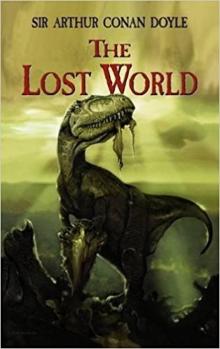 The Lost World
The Lost World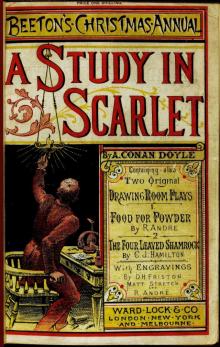 A Study in Scarlet
A Study in Scarlet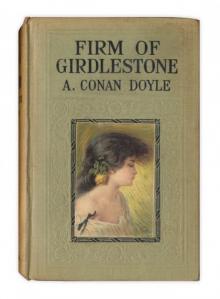 The Firm of Girdlestone
The Firm of Girdlestone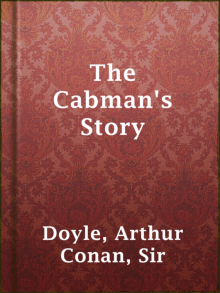 The Cabman's Story
The Cabman's Story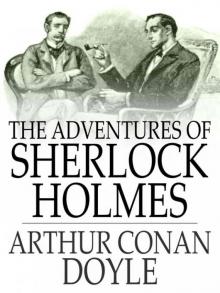 The Adventures of Sherlock Holmes
The Adventures of Sherlock Holmes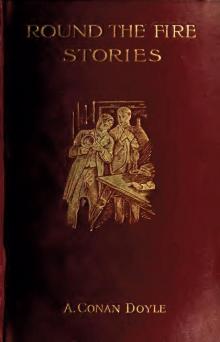 Round the Fire Stories
Round the Fire Stories His Last Bow: An Epilogue of Sherlock Holmes
His Last Bow: An Epilogue of Sherlock Holmes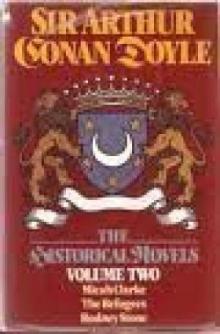 Micah Clarke
Micah Clarke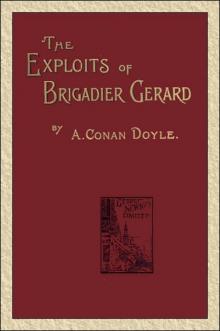 The Exploits of Brigadier Gerard
The Exploits of Brigadier Gerard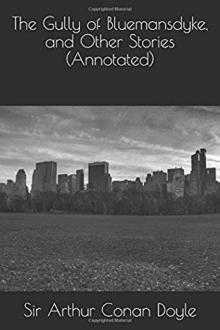 The Gully of Bluemansdyke, and Other stories
The Gully of Bluemansdyke, and Other stories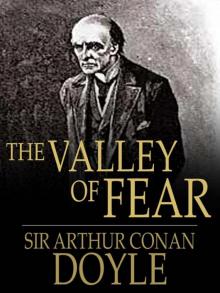 The Valley of Fear
The Valley of Fear The Last of the Legions and Other Tales of Long Ago
The Last of the Legions and Other Tales of Long Ago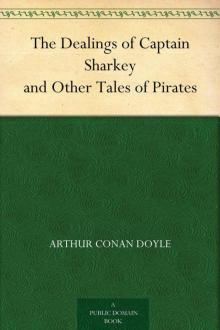 The Dealings of Captain Sharkey, and Other Tales of Pirates
The Dealings of Captain Sharkey, and Other Tales of Pirates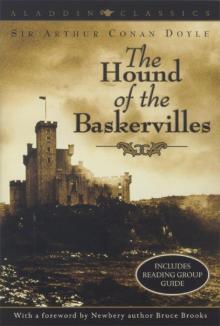 The Hound of the Baskervilles
The Hound of the Baskervilles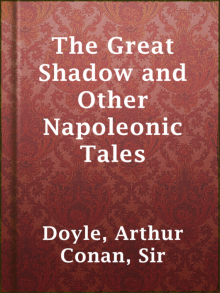 The Great Shadow and Other Napoleonic Tales
The Great Shadow and Other Napoleonic Tales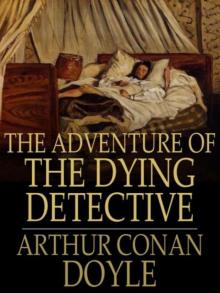 The Adventure of the Dying Detective
The Adventure of the Dying Detective The Man from Archangel, and Other Tales of Adventure
The Man from Archangel, and Other Tales of Adventure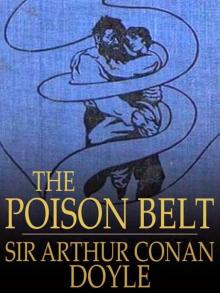 The Poison Belt
The Poison Belt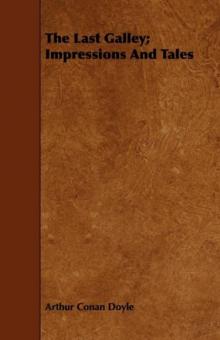 The Last Galley; Impressions and Tales
The Last Galley; Impressions and Tales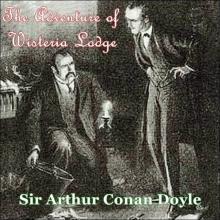 The Adventure of Wisteria Lodge
The Adventure of Wisteria Lodge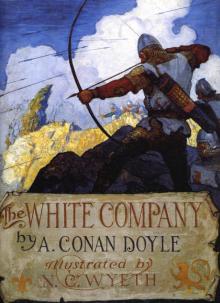 The White Company
The White Company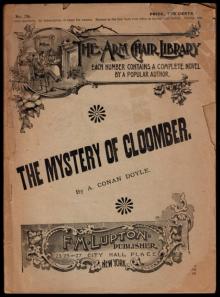 The Mystery of Cloomber
The Mystery of Cloomber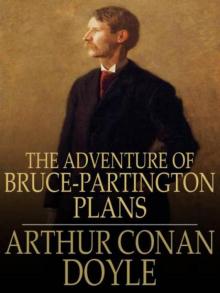 The Adventure of the Bruce-Partington Plans
The Adventure of the Bruce-Partington Plans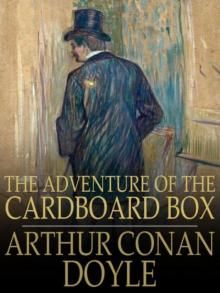 The Adventure of the Cardboard Box
The Adventure of the Cardboard Box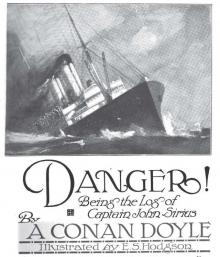 Danger! and Other Stories
Danger! and Other Stories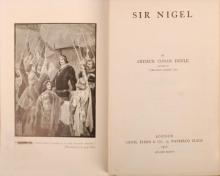 Sir Nigel
Sir Nigel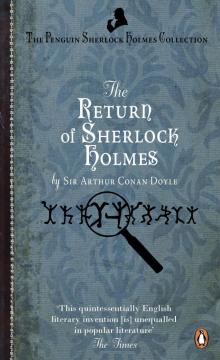 The Return of Sherlock Holmes
The Return of Sherlock Holmes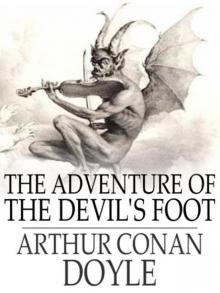 The Adventure of the Devil's Foot
The Adventure of the Devil's Foot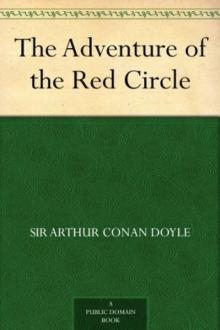 The Adventure of the Red Circle
The Adventure of the Red Circle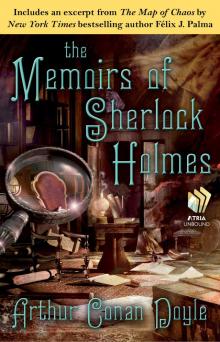 The Memoirs of Sherlock Holmes
The Memoirs of Sherlock Holmes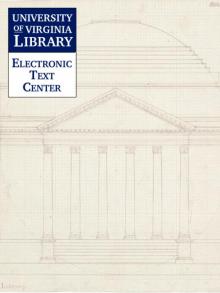 The Adventure of the Yellow Face
The Adventure of the Yellow Face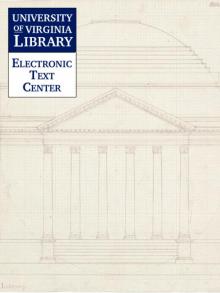 The Adventure of the Norwood Builder
The Adventure of the Norwood Builder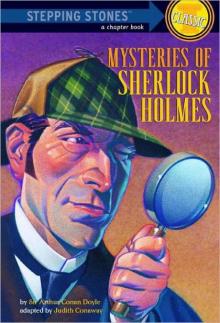 Mysteries of Sherlock Holmes
Mysteries of Sherlock Holmes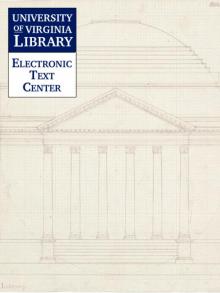 The Adventure of the Missing Three-Quarter
The Adventure of the Missing Three-Quarter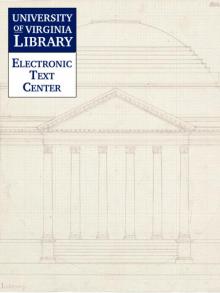 The Adventure of the Final Problem
The Adventure of the Final Problem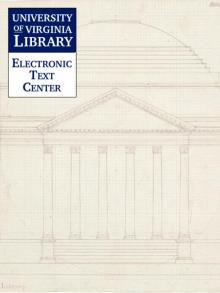 A Scandal in Bohemia
A Scandal in Bohemia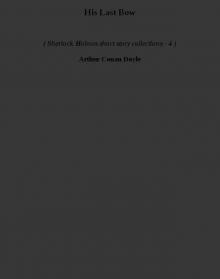 His Last Bow shssc-4
His Last Bow shssc-4 Beyond The City
Beyond The City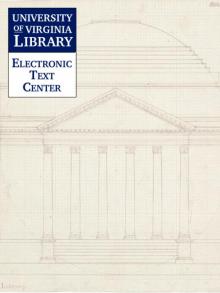 The Adventure of the Gloria Scott
The Adventure of the Gloria Scott The Parasite
The Parasite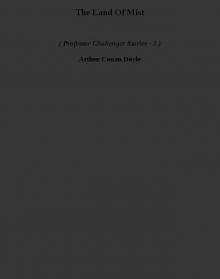 The Land Of Mist pcs-3
The Land Of Mist pcs-3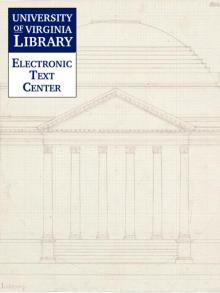 The Adventure of the Musgrave Ritual
The Adventure of the Musgrave Ritual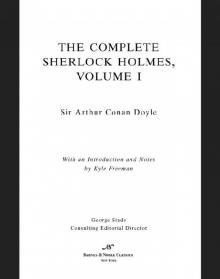 The Complete Sherlock Holmes, Volume I (Barnes & Noble Classics Series)
The Complete Sherlock Holmes, Volume I (Barnes & Noble Classics Series)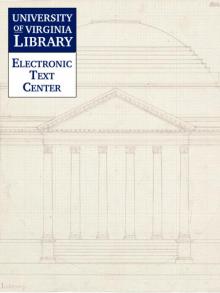 The Adventure of the Stockbroker's Clerk
The Adventure of the Stockbroker's Clerk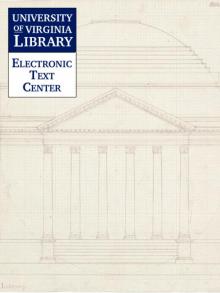 The Adventure of the Copper Beeches
The Adventure of the Copper Beeches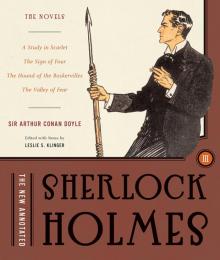 The New Annotated Sherlock Holmes
The New Annotated Sherlock Holmes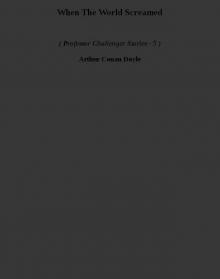 When The World Screamed pcs-5
When The World Screamed pcs-5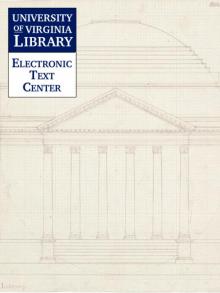 The Adventure of the Six Napoleons
The Adventure of the Six Napoleons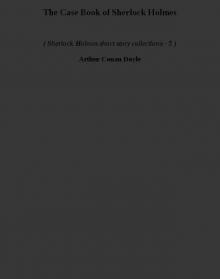 The Case Book of Sherlock Holmes shssc-5
The Case Book of Sherlock Holmes shssc-5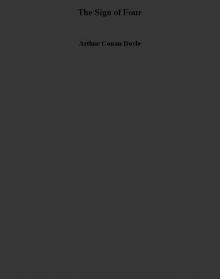 The Sign of Four
The Sign of Four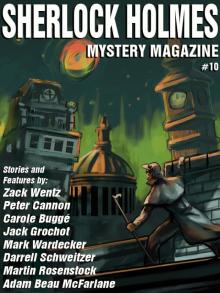 Sherlock Holmes Mystery Magazine #10
Sherlock Holmes Mystery Magazine #10 The Adventures of Brigadier Gerard
The Adventures of Brigadier Gerard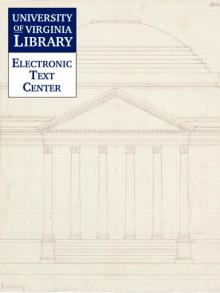 The Adventure of the Second Stain
The Adventure of the Second Stain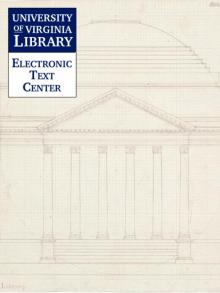 The Adventure of the Engineer's Thumb
The Adventure of the Engineer's Thumb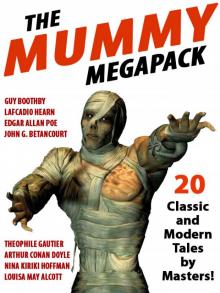 The Mummy Megapack
The Mummy Megapack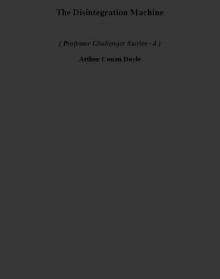 The Disintegration Machine pcs-4
The Disintegration Machine pcs-4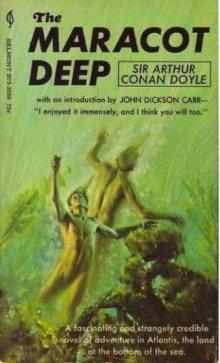 The Maracot Deep
The Maracot Deep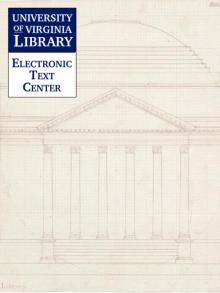 The Five Orange Pips
The Five Orange Pips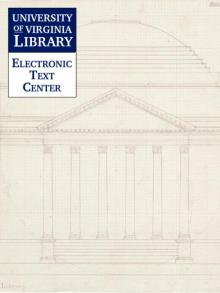 The Adventure of the Crooked Man
The Adventure of the Crooked Man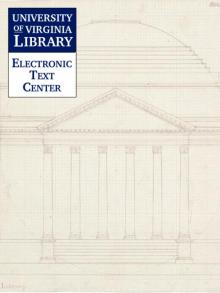 The Adventure of the Blue Carbuncle
The Adventure of the Blue Carbuncle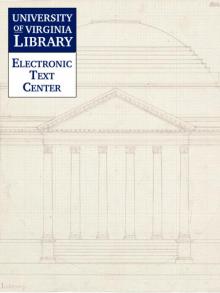 The Adventure of Silver Blaze
The Adventure of Silver Blaze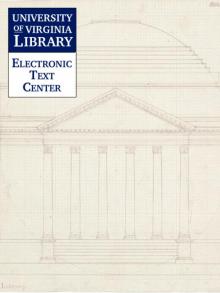 The Adventure of the Solitary Cyclist
The Adventure of the Solitary Cyclist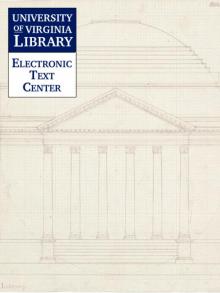 The Adventure of the Naval Treaty
The Adventure of the Naval Treaty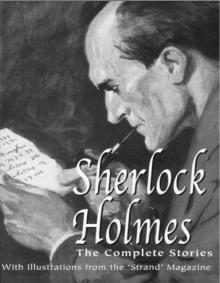 Sherlock Holmes. The Complete Stories
Sherlock Holmes. The Complete Stories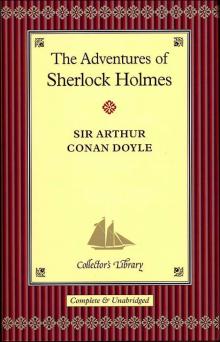 The Adventures of Sherlock Holmes (sherlock holmes)
The Adventures of Sherlock Holmes (sherlock holmes)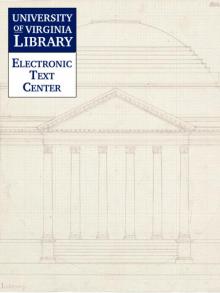 The Adventure of the Empty House
The Adventure of the Empty House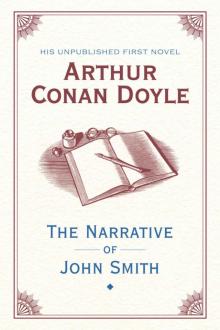 The Narrative of John Smith
The Narrative of John Smith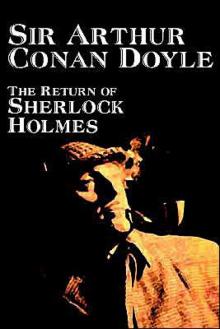 The Return of Sherlock Holmes (sherlock holmes)
The Return of Sherlock Holmes (sherlock holmes)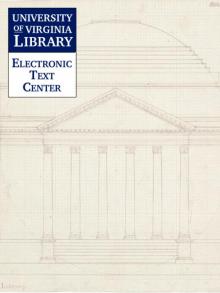 The New Revelation
The New Revelation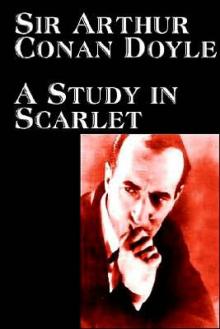 A Study in Scarlet (sherlock holmes)
A Study in Scarlet (sherlock holmes)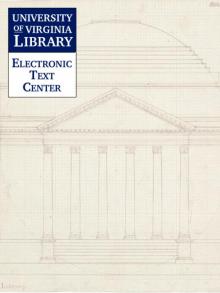 The Vital Message
The Vital Message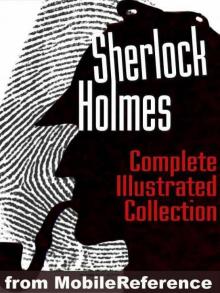 Sherlock Holmes Complete Collection
Sherlock Holmes Complete Collection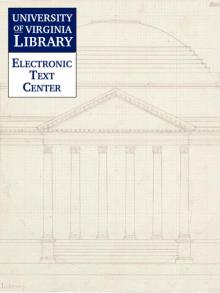 Round the Red Lamp
Round the Red Lamp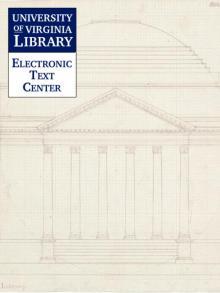 The Boscombe Valley Mystery
The Boscombe Valley Mystery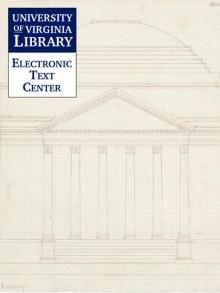 The Adventure of the Beryl Coronet
The Adventure of the Beryl Coronet The Refugees
The Refugees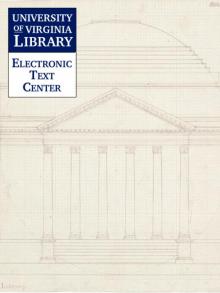 The Adventure of the Three Students.
The Adventure of the Three Students.